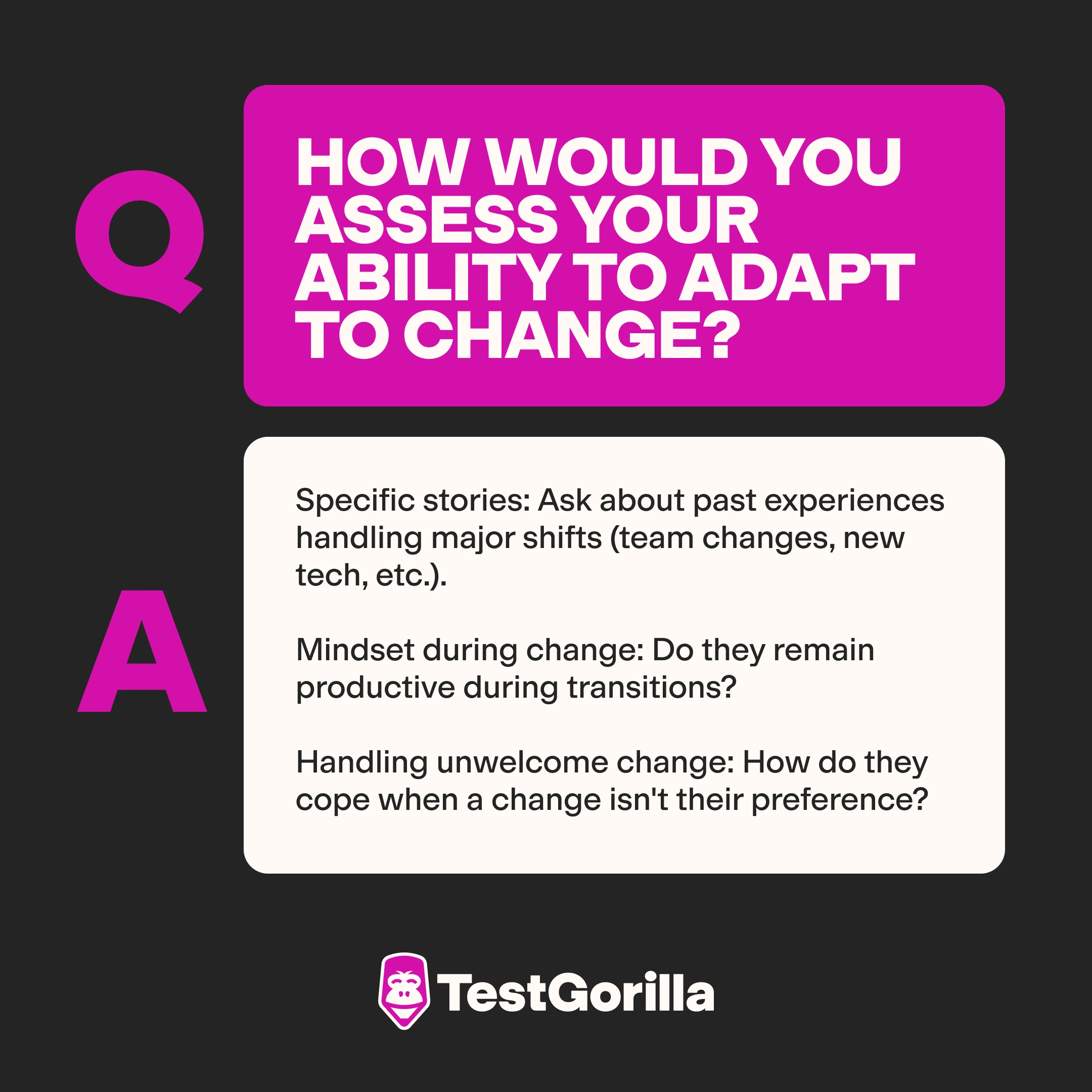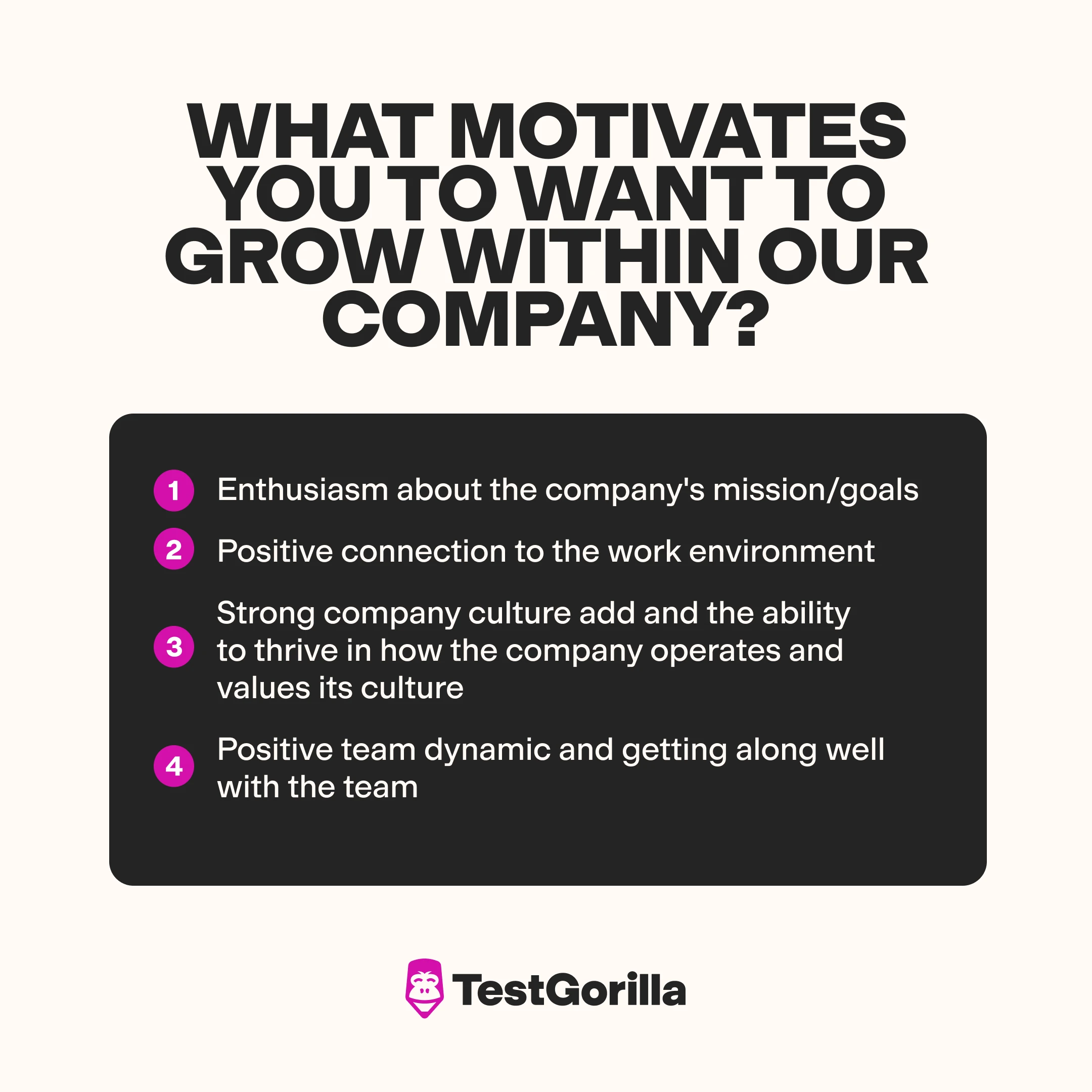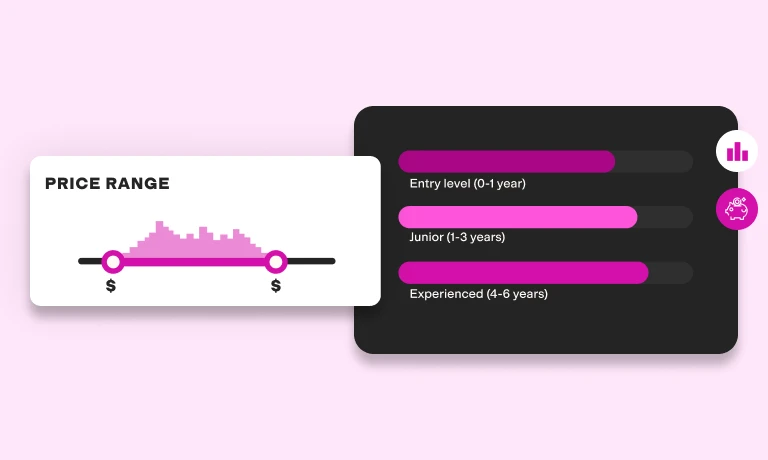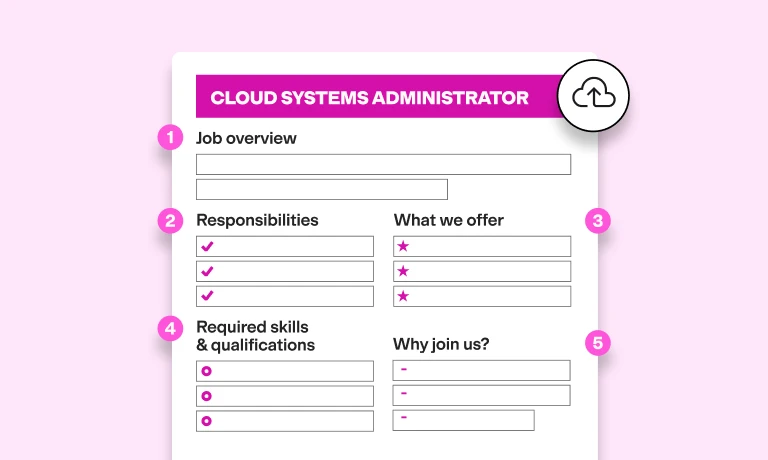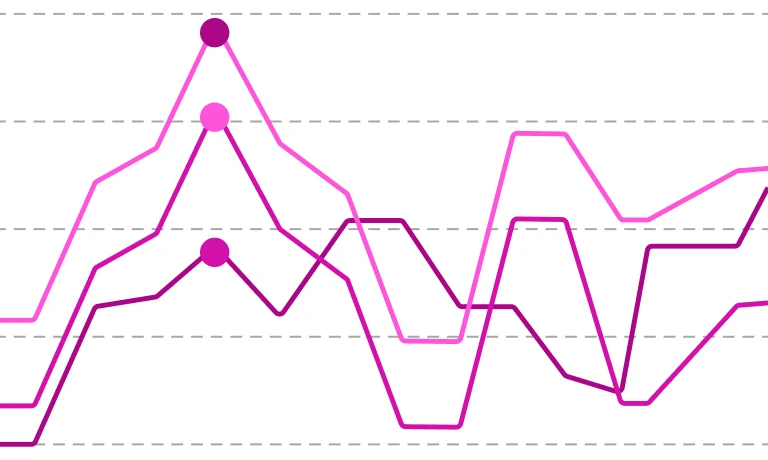Top 25 internal interview questions to spot and promote your best talent
Do you have an internal mobility policy? How about an internal talent marketplace?
Internal recruitment is a win-win strategy: Your employees can grow and feel happier and more engaged at work and you can fill open positions faster and at a fraction of the cost.
But to spot the best talent for any role and eliminate any unfair internal hiring practices, you need a well-structured interviewing process. Even if you think you know your team members well, assessing their skills and conducting interviews is essential for giving everyone a fair chance and making the right hiring decision.
To help you out, we’ve selected the best 25 internal interview questions you can ask your employees to get to know them better and see whether they’re the perfect fit.
Combine these questions with the right skills tests and you’ll have a winning combination.
Top 25 internal interview questions to hire top talent internally
Below, you’ll find our selection of the best interview questions to ask candidates when recruiting internally.
To make your life easier, we’ve also included our tips on what to expect from interviewees and how to evaluate their answers.
1. Can you describe your current role and key responsibilities?
Obviously, when interviewing for internal promotions, you’ll be well aware of the candidate’s current role; however, this question prompts them to explain it in their own words, so that you can see how they see it.
Look for a clear and concise description of how they contribute to the team and the company on a high level, rather than a detailed description of their day-to-day tasks.
Do applicants talk about their team as a whole, or do they always talk only about their individual role? Is their understanding of the role in line with yours? Or of their manager?
This question helps you gauge a candidate’s self-awareness and their ability to reflect on their own performance. For deeper insights on this, you can use our employee self-assessment template Google Sheet from our talent assessment templates.
2. What achievements in your current position are you most proud of?
Recruiting candidates’ sense of pride and accomplishment is a key strategy in helping them aim high. It reveals what they value in their work and helps you see whether those are the things that matter the most for the business.
Listen for achievements that align with your company’s values and those that show ambition, initiative, and problem-solving.
3. What aspects of your current role do you find the most challenging?
That’s a difficult question, but candidates’ answers can tell you a lot about their character and resilience – and about the areas where they might need your support. It’s also a chance to see if they are proactive about finding solutions.
Are the challenges they mention related to skills, team dynamics, external factors, or the industry as a whole?
4. Can you tell us about a mistake you've made in the past year? How did you correct it and what did you learn from it?
Not everyone can handle mistakes gracefully or has the ability to reflect on them and discuss them with others.
This question helps you see whether candidates can take responsibility and learn from errors. Look for honesty and accountability in their response; the best employees will focus on the solution and the lessons rather than on the issue itself.
You can use our Big 5 (OCEAN) test to evaluate candidates’ conscientiousness and emotional stability, which are key for handling mistakes well.
5. What prompted you to apply to this new position?
Motivation is crucial in any role, and knowing why someone applied can help you see whether their goals align with the organization's direction.
Are they looking for growth opportunities, more responsibilities, or a new challenge? Are they looking to change teams because of team dynamics? Do they want to develop their skills? Do they have skills that they’re currently not using as much as they’d like?
For more insights into this, use our Motivation test.
6. What aspects of this new role excite you the most?
You can use this question to follow up on the previous one or on its own. It's a great way to see if they understand the position and are genuinely interested in the opportunities it offers.
Look for specific aspects they mention, such as key responsibilities or tasks, learning opportunities, or the chance to work with the new team. The level of their excitement is a good indicator of their motivation.
7. How do you think this position will help you grow as a professional?
Do the candidate’s career goals align with the role? Do they have a growth mindset? Are they eager to take on new challenges?
Look for applicants who understand the role's potential and are able to explain how it’d help them upskill, get new experiences, or use their leadership skills.
8. What long-term objectives would you set if you were hired for this position?
Setting long-term objectives shows candidates are intentional about their contributions to the company. This question helps you see the candidate's vision for the role and check their alignment with the team.
Are their goals realistic and attainable? Do they have a clear idea of what they want to achieve? This can indicate their strategic thinking and commitment to the role.
9. What skills have you developed in your current job that you believe are relevant to the new position?
Are candidates able to link their current skill set to the demands of the new role?
This question assesses their self-awareness and understanding of the job requirements. Look for specific skills they mention, such as technical knowledge, project management, or team-player qualities.
10. Can you give us an example of a project where you used those skills?
Ask candidates to provide evidence of how they've used the skills they talked about previously. This way, you’ll see whether they have the right hands-on experience for the new position.
11. What are your key strengths that you believe are relevant to this new role?
Although it’s similar to the previous ones, this question takes a slightly different direction. Candidates’ strengths (and weaknesses) aren’t simply about skills; they’re about their personalities as a whole.
Examples they might mention include:
Problem-solving
Creativity
Flexibility
Critical thinking
Motivation
Perseverance
For deeper insights, use our personality and culture and cognitive ability tests.
12. How would you assess your ability to adapt to change?
Resilience and adaptability are essential for businesses, as well as for their employees. Cognitive flexibility is essential when looking to upskill and adapt to new requirements – and taking on a new role is an important change in one’s career.
Listen for examples of when candidates have successfully managed major changes, such as the restructuring of teams or the implementation of a new technology. Are they capable of switching gears and remaining productive during times of change? How do they deal with changes they don’t agree with? What’s their experience working with generative AI?
13. What areas do you need to improve to succeed in this new position?
Self-awareness of weak spots is as important as knowing one's strengths. Are candidates willing to continue to grow and learn? Are they able to discuss their weaknesses with honesty and integrity? Do they have a plan on how to develop new skills?
14. What training opportunities are you most interested in?
Check the candidate’s commitment to their professional development with this question. Look for specifics about the types of training they are interested in and how these align with the new role.
Do they know what internal resources they can access? Have they checked external resources they can use, such as online courses or masterclasses? Are they looking to enhance existing skills or gain new ones?
15. Tell me something your current manager doesn't know about you.
This question invites the candidate to be creative and maybe even go slightly off-topic. It might offer a glimpse into hidden skills or unique traits or experiences they have. Look for interesting details that show their inventiveness and personality in a way that performance reviews cannot capture.
16. Can you tell me about a difficult situation you encountered at your job in the past few months? How did you handle it?
Problem-solving skills are nearly as important as technical ability for many roles – and with this question, you can get an idea of a candidate’s critical thinking.
Look for details about the situation, their approach, and the results. Did they ask others for help? Did they ask their manager for advice? Did they try a few different methods?
Use our Problem Solving test to see how applicants use their analytical skills to deal with difficult situations.
17. What improvements to our current processes would you suggest?
Look for those candidates who have a keen eye for improvement. This question assesses a few things at once:
Their critical thinking
Their familiarity with the company's processes
Their ability to design and implement changes
Their willingness to speak up about inefficiencies
Strong candidates will give thoughtful insights that show their desire to improve the way your company operates.
To assess their critical thinking skills and ability to analyze information, use a Critical Thinking test.
18. What do you think is the biggest challenge our company is facing currently?
Top candidates will be well aware of the industry and the company’s challenges. This shows whether they understand the broader business environment beyond their role and responsibilities.
Look for their perspective on the challenges and any suggestions they might have to overcome these. This will show you whether they can bring fresh insights to the table and help your business achieve its goals.
19. What do you think about our company’s current direction?
Use this question to assess whether a candidate’s vision aligns with that of your company.
Do they feel positive, skeptical, or indifferent about where the company is heading? If they feel skeptical, are they able to explain why and give ideas on what could be improved? Do they understand the company’s strategic plans?
20. How do you see our industry changing in the next five years?
With this question, you can evaluate the candidate's interest in (and knowledge of) your industry as a whole. It shows whether they can keep up with trends and understand risks, opportunities, and challenges.
Look for insightful answers that touch on the impact of potential disruptions on the company and on their role – and how they plan to adapt.
21. What motivates you to want to grow within our company and not look for a similar job elsewhere?
This is a tricky question, but also an important one – and it helps you see the reasons why someone is staying rather than chasing other opportunities elsewhere.
Top answers would go beyond convenience and ease. For example, are they excited and optimistic about the company’s future? Do they enjoy working in this specific work environment? Do they like the company culture and identify with it? Do they get along well with the team?
22. What do you like about our company culture?
Do the candidate's values align with the company's culture?
Obviously, they do, at least to an extent – otherwise they wouldn’t be here.
However, this question helps you get a more nuanced idea. It enables you to see what exactly they appreciate about the work environment and whether they can successfully grow within the business, potentially even to leadership roles.
For a deeper look into this, check out our Culture Add test.
23. What is one aspect about our company culture that you'd change?
This question tests the candidate's critical thinking and willingness to speak up and help implement changes. It can even uncover issues that may not be visible to you or to others in the HR department.
Top candidates will provide constructive feedback and might suggest changes that are worth considering.
24. Do you prefer to work within a small and tightly knit team or a larger one with a clear hierarchical structure?
This question helps identify the best team environment for the person to thrive.
Their preference can indicate the type of work and leadership style they are most comfortable with. This also helps you assess whether they'll fit into the team they're joining – or whether they have the potential to grow to other roles and teams.
25. If you get this new role, how would you ensure a smooth transition process for your former team?
Succession planning is relevant not only for C-suite roles – and the best way to ensure a smooth transition is to have the employee actively participate in it.
Strong answers will include plans to:
Put their processes and workflows in writing
Train the next person who’ll be taking on their current role
Set up a transition timeline
Leverage internal mobility to retain your best talent
To hire the right people for any role, you need to evaluate their skills objectively, regardless of whether you’re hiring internally or externally.
But did you know that skills assessments are a great way to assess your existing talent, too?
Use skills tests in combination with the right interview questions, and you’ll be sure to spot top performers and retain your best employees.
Book a free 30-minute live demo to see how TestGorilla can help you simplify your internal hiring process – or simply sign up for our free plan and try it out for yourself today.
The best insights on HR and recruitment, delivered to your inbox.
Biweekly updates. No spam. Unsubscribe any time.
Related posts
You've scrolled this far
Why not try TestGorilla for free, and see what happens when you put skills first.


